Organic food is the food that has been grown in healthy conditions, without using pesticides, herbicides, GMOs, and sewage and petroleum-based fertilizers. In terms of animal-based products, such as meat, eggs, and dairy products, it means that the animals were fed with organic food and not given growth hormones, antibiotics, or animal by-products. As a result, eating organic food, such as organic eggs, organic fruits, and even organic chocolate or other products, has numerous health benefits. So, let’s have a look at them.
It’s Safer
Let’s start with the fact that organic food doesn’t contain any harmful elements, such as pesticides or GMOs. As it’s known, no matter how much you wash and clean your food, the chemicals used during growing and processing remain on or in the food. That means that you don’t have to worry about your health since you won’t consume any of those things when eating organic food. In that way, it protects you and prevents any unwanted situation, such as poisoning or gastrointestinal problems.
It Contains a Lower Level of Nitrates
Organic food contains lower levels of nitrates compared to conventionally grown food. This is very important because nitrates are associated with a higher risk of methemoglobinemia in children and gastrointestinal cancer. Moreover, the KOALA Birth Cohort Study in the Netherlands found that organic dairy products are related to lower eczema rates.
It Contains More Nutrients
Organic foods contain are more nutritious as they have been grown more naturally without adding any chemicals or GMOs. As it’s known, they contain more vitamin C, carotenoids, and phenolic compounds. And, each of these nutrients plays an important role in our health.
- Vitamin C protects your cells which results in a stronger immune system, healthier bones, blood vessels, hair, skin, and helps in healing wounds.
- Carotenoids function as antioxidants. They prevent disease and support your immune system. They can also improve your eye health and support your growth since some of them are converted into vitamin A.
- Phenolic compounds have anti-inflammatory, antioxidant, antimutagenic, and anti-carcinogenic properties. By consuming foods that are rich in polyphenols may reduce oxidative stress and decrease the risk of coronary heart disease.
Apart from having these nutrients in organic food, it has to be mentioned that milk, eggs, and meat are richer in omega-3 fatty acids. These fats are very beneficial to your health because they:
- Help with anxiety and depression
- Improve your eye health
- Reduce the risk of heart disease
- Help fight inflammation, etc.
Other Reasons Why You Should Eat Organic Food
We have already mentioned that organic food doesn’t contain pesticides, harmful fertilizers, GMOs, or animal by-products. But, those aren’t the only reasons you should choose organic over conventionally-grown food. There are 2 other reasons why organic food is better and healthier, including:
- It’s fresher – not containing preservatives which make foods last longer, organic foods are fresher and healthier. Also, they are usually grown on the near local farms. And, consuming fresh food ensures you receive more nutrients.
- It’s eco-friendly – growing food organically helps reduce pollution, soil erosion, conserve water, increase soil fertility, and reduce energy use. All of these factors contribute to a healthier environment, which is the main factor for being healthy.

Tips for Buying Organic Food
We know that organic food is usually more expensive. Actually, its price is the main reason why people choose conventionally-grown food over the organic one. Nonetheless, there are some ways you can buy organic food without breaking your bank, including:
- Buying in-season – When fruits and vegetables are in season, their price is lower.
- Buying in bulk – When buying in bulk, you save money. You can either buy in bulk and freeze the food or you can buy with your family, friends, and/or neighbours and share the food and the cost.
- Buying at local farmers’ markets – These markets offer products, such as meat, eggs, milk, and cheese, for a lower price compared to grocery stores and supermarkets.
- Comparing prices – visit several grocery stores and supermarkets and compare the prices of the products you are looking for because they all have a different price per product, and some may also offer a discount on some organic products.



